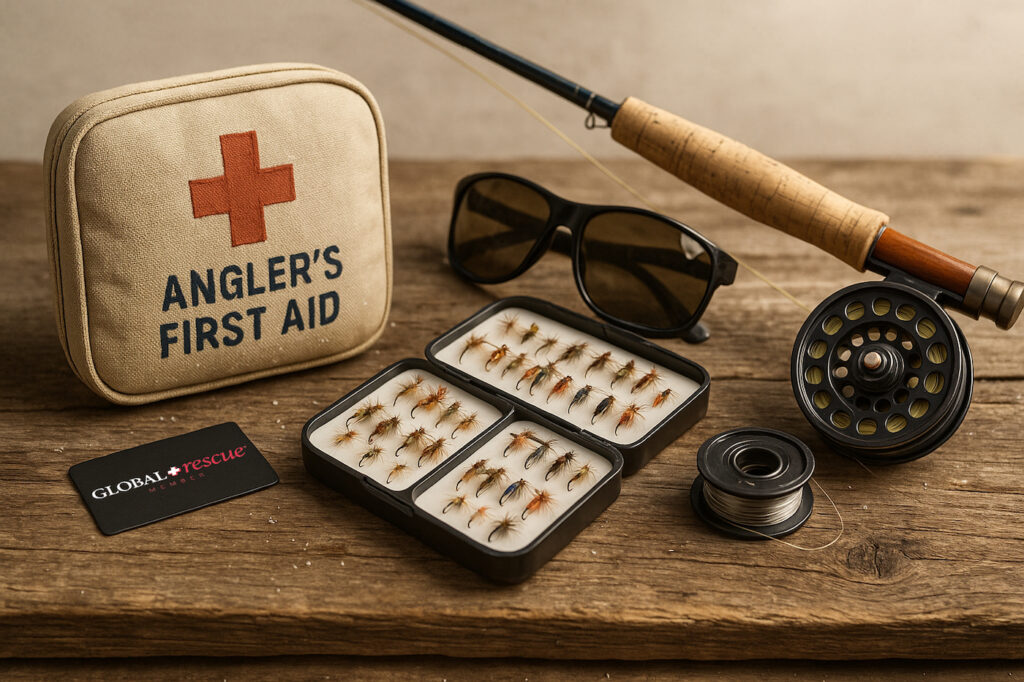Contributed by Global Rescue
For saltwater fly anglers, the thrill of chasing bonefish, tarpon, and elusive permit across crystal-clear flats is irresistible. Achieving the coveted Grand Slam—landing all three species in a single day—is the pinnacle of the sport. But what happens when your adventure takes a turn? From remote atolls in the Indian Ocean to jungle rivers in Central America, anglers often find themselves far from reliable medical care. That’s where Global Rescue steps in.
A Silver Sponsor of Bonefish & Tarpon Trust, Global Rescue is the trusted partner of anglers worldwide, offering field rescue, medical evacuation, and travel intelligence for those casting in the most remote fishing destinations. With services that include emergency response, air evacuations, and real-time communication, Global Rescue ensures that even in the wilderness, you’re never alone.
The world’s best bonefish, tarpon, and permit fishing destinations are often some of the most remote places to travel. We grouped them by remoteness and evaluated the likelihood of a Grand Slam, the local dangers, emergency response availability, and the quality of available medical care.
Grand Slam Remote Destinations
Cuba (Jardines de la Reina): A top Grand Slam destination. However, political restrictions and outdated medical systems make emergency response difficult. Evacuations face bureaucratic delays.
Los Roques, Venezuela: Bonefish haven with tarpon and permit. A Level 4 “Do Not Travel” advisory by the US Department of State is due to unrest, crime, and healthcare collapse. Emergency services are sparse.
Belize: High Grand Slam potential. Solid private hospitals in Belize City and coordinated coastal emergency services.
Ascension Bay, Mexico: Grand Slams are common. Emergency care is several hours away but accessible. Heat-related injuries are a concern.
Honduras: Grand Slam possible. Level 3 “Reconsider Travel” advisory due to crime. Roatán has decent clinics; severe cases require evacuation.
Turks and Caicos: Safe, semi-remote destination. Excellent bonefishing, occasional permit, limited tarpon. High-end hospital available in Providenciales.
Puerto Rico: Moderate to high Grand Slam potential. Strong emergency response and high-quality hospitals in San Juan.
Moderately Remote and Easier Destinations
Dominican Republic: Rare Grand Slams. Reliable private hospitals in Santo Domingo. Minor injury risks.
Florida Keys: Consistent Grand Slam fishery. Top-tier hospitals and rapid EMS. Low travel risk.
Bahamas: World-class bonefish fishing. Increasing permit and tarpon opportunities. Quality care in Nassau and Freeport. Evacuations are needed from remote cays.
Aruba/Bonaire/Curacao: Bonefish and permit found; tarpon rare. Modern hospitals and fast emergency response.
Rare or Impossible Grand Slams
The following destinations may not offer a realistic shot at a Grand Slam due to the absence of one or more target species, but they remain among Earth’s most exciting and rewarding fisheries. Their remoteness, natural beauty, and often unpressured waters make them exceptional for dedicated anglers seeking solitude, challenge, and unforgettable catches.
Seychelles (Alphonse, Farquhar, Cosmoledo): A paradise for bonefish and Indo-Pacific permit, but tarpon are absent. Emergency medical response is limited; serious injuries require international evacuation.
Mauritius (St. Brandon’s Atoll): Pristine flats, no tarpon, and no emergency care on-site. Anglers are days from Port Louis, where hospitals are decent but not trauma-equipped.
Christmas Island, Kiribati: Famous for bonefish but lacking tarpon. One weekly flight from Honolulu means evacuations are delayed. Minor injuries can escalate quickly.
Nicaragua (Rio San Juan): Jungle tarpon only. No bonefish or permit. Level 3 “Reconsider Travel” advisory due to arbitrary detention and limited healthcare.
Brazil (Amazon): Tarpon and occasional permit. No bonefish. Emergency first responders are virtually nonexistent. Evacuations are complicated but possible from urban centers.
Costa Rica: Prime tarpon zone. Bonefish rare. Emergency care solid in San José. Jungle terrain complicates access.
Campeche, Mexico: Baby tarpon capital. Grand Slam is unlikely. Quality hospitals nearby. Low travel risk.
Panama: No bonefish. Limited emergency response in Bocas del Toro. Panama City has excellent hospitals.
Louisiana Marsh: Giant redfish and tarpon. No bonefish. Excellent hospitals within driving distance.
Rescue From the Place of Injury
Global Rescue will come to you whether you’re on a skiff, trawler, or trekking jungle trails. Once you contact them via satellite phone, email, or the Global Rescue app, their operations team initiates two-way communication and coordinates an appropriate evacuation strategy. Within 100 miles of the coast, you could be reached by helicopter or ship. Further out, they’ll deploy vetted local partners or maritime assistance. Once stabilized, Global Rescue can evacuate you to your hospital of choice.
That’s what happened to Dolly Webster, who fell gravely ill with a contagious illness while on a bonefishing trip in Great Inagua. With few options and no hospital nearby, her partner called Global Rescue. A medically-equipped air ambulance evacuated her to Miami, where she received life-saving care.
Fishing First Aid Kits
Global Rescue’s medical experts recommend anglers pack like they’re going remote—because many are. Medical supervisor Jeffrey Weinstein, trained in wilderness rescue, advises anglers to carry wound care supplies, OTC medications, antihistamines, rehydration salts, motion sickness meds, an Epi-Pen, and antiemetics. He also vacuum-seals each module for waterproofing.
Outfitters and anglers agree that a first-aid kit is a must-pack item. Patrick Pendergast of The Fly Shop carries a waterproof paddler’s kit. Amy Ray of The Sisterhood of the Outdoors swears by iodine wipes, Steri strips, and finger splints. “Where we go, you can’t walk out,” she says.
The Global Rescue Connection
Whether you’re targeting a Grand Slam in Belize, a bonefish paradise in the Seychelles, or tarpon in Costa Rica, fishing comes with risk. Hook injuries, slips, dehydration, or even cardiac events can quickly turn serious. That’s why anglers choose Global Rescue for peace of mind.
As Jim Klug of Yellow Dog Flyfishing says, “Never leave home without a Global Rescue membership.”
Global Rescue and Bonefish & Tarpon Trust
Global Rescue is the exclusive evacuation and travel insurance provider for Bonefish & Tarpon Trust. The company has renewed its support of BTT’s conservation programs as a Silver Corporate Partner. “Global Rescue is a trusted partner for BTT’s staff, who often travel to remote locations to conduct research that will inform conservation and resource management,” said Jim McDuffie, BTT’s President and CEO. “We appreciate Global Rescue’s renewed support of our mission and commitment to fisheries conservation.”




